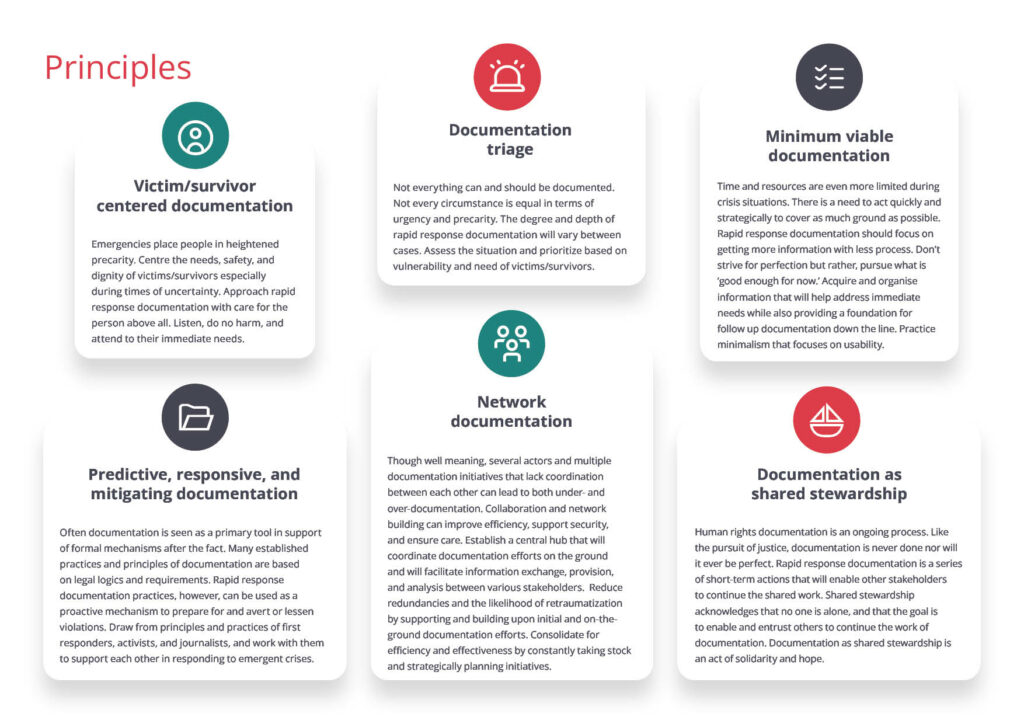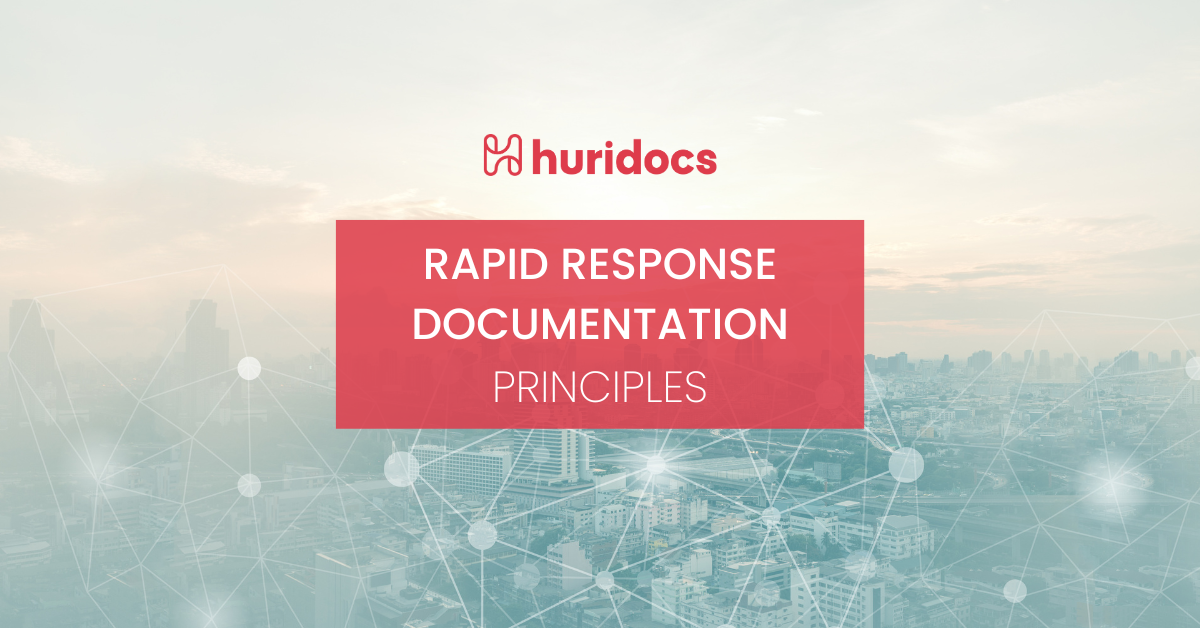Facing shrinking and precarious civic spaces and battling a culture of impunity emboldened by authoritarian regimes, human rights defenders are often called to respond to both ongoing and emerging violations at a moment’s notice. From violent crackdowns during mobilisations to abuses during humanitarian emergencies, sudden onset crises and quickly deteriorating human rights situations call for rapid, systematised, and secure responses from defenders. On-the-ground documentation of human rights violations in such circumstances of evolving uncertainty is a key component of short-term interventions and long-term mechanisms of justice.
Documentation must be done systematically, safely, and ethically as a time-critical intervention. Established human rights documentation practices, however, tend to be slow. This slowness invariably leads to both under- and over-documentation. This dual crisis of documentation risks exposing victims and survivors to re-traumatisation, while failing to support their immediate needs and their often lengthy pursuit for justice.
Current human rights documentation guidelines do not actively consider time as a key element. These guidelines often focus on what needs to be documented. Centering time—timing and timeliness—acknowledges that what can be documented and how to go about documenting them can (and at times, must) differ based on when the documentation is being done. In line with this, we put forward the concept of rapid response documentation.
Rapid response documentation (RRD) is the timely, systematic, secure, and ethical recording, collection, and preservation of information on human rights violations during crisis emergencies. Human rights defenders, particularly those on the ground, have already been doing RRD. While a lot of recent focus has been on open source investigations, we name RRD as a practice to give attention and provide support to on-the-ground documenters who —often at great risk with limited resources— do the integral though invisible work of first response documentation. As one of the first responders, these documentors and documentalists enable the work of various actors across the human rights ecosystem.
Rapid response documentation can counter, prevent, or minimise human rights abuses before they further develop. RRD can help in quickly drawing attention to the crisis, securing support from various parties, and enacting strategic interventions. In addition, RRD lays down a strong foundation for various long-term justice mechanisms including providing leads for criminal investigations, data for reparations, and narratives for memorialisation.
We at HURIDOCS, together with twelve (12) partner community organisations across South and Southeast Asia, came together to share and discuss our experiences in doing rapid response documentation. In addition to acknowledging and drawing from each other’s expertise (community-grounded epistemology), we also looked into and studied practices in other fields engaged in rapid response work. We derived concepts and approaches from the fields of humanitarianism, emergency medicine, risk management, disaster planning, and archives & records management. The result of this exchange, supported by the Digital Defenders Partnership, is an articulation of a set of principles and concepts that can guide the development of context-specific tools and methodologies in doing rapid response documentation. Below we share these principles.
Principles of Rapid Response Documentation
- Victim/survivor-centred documentation. Emergencies place people in heightened precarity. Centre the needs, safety, and dignity of victims/survivors especially during times of uncertainty. Approach rapid response documentation with care for the person above all. Listen, do no harm, and attend to their immediate needs.
- Documentation triage. Not everything can and should be documented. Not every circumstance is equal in terms of urgency and precarity. The degree and depth of rapid response documentation will vary between cases. Assess the situation and prioritize based on vulnerability and need of victims/survivors.
- Minimum viable documentation. Time and resources are even more limited during crisis situations. There is a need to act quickly and strategically to cover as much ground as possible. Rapid response documentation should focus on getting more information with less process. Don’t strive for perfection but rather, pursue what is ‘good enough for now.’ Acquire and organise information that will help address immediate needs while also providing a foundation for follow up documentation down the line. Practice minimalism that focuses on usability.
- Predictive, responsive, and mitigating documentation. Often documentation is seen as a primary tool in support of formal mechanisms after the fact. Many established practices and principles of documentation are based on legal logics and requirements. Rapid response documentation practices, however, can be used as a proactive mechanism to prepare for and avert or lessen violations. Draw from principles and practices of first responders, activists, and journalists, and work with them to support each other in responding to emergent crises.
- Networked documentation. Though well meaning, several actors and multiple documentation initiatives that lack coordination between each other can lead to both under- and over-documentation. Collaboration and network building can improve efficiency, support security, and ensure care. Establish a central hub that will coordinate documentation efforts on the ground and will facilitate information exchange, provision, and analysis between various stakeholders. Reduce redundancies and the likelihood of re-traumatisation by supporting and building upon initial and on-the-ground documentation efforts. Consolidate for efficiency and effectiveness by constantly taking stock and strategically planning initiatives.
- Documentation as shared stewardship. Human rights documentation is an ongoing process. Like the pursuit of justice, documentation is never done nor will it ever be perfect. Rapid response documentation is a series of short-term actions that will enable other stakeholders to continue the shared work. Shared stewardship acknowledges that no one is alone, and that the goal is to enable and entrust others to continue the work of documentation. Documentation as shared stewardship is an act of solidarity and hope.

These principles were co-developed by HURIDOCS with documenters and documentalists from the following organisations: Asia Justice and Rights, Indonesia Team (AJAR) Center for Trade Union and Human Rights (Philippines) Equality Myanmar (EQMM) Families of the Disappeared (Sri Lanka) KontraS (Indonesia) National Council of the Churches in the Philippines (NCCP) Odhikar (Bangladesh) SAVE (Bangladesh) Suriya Women’s Development Centre (Sri Lanka) TAPOL WITNESS Women’s League of Burma (WLB) This initiative was generously supported by the Digital Defenders Partnership.
